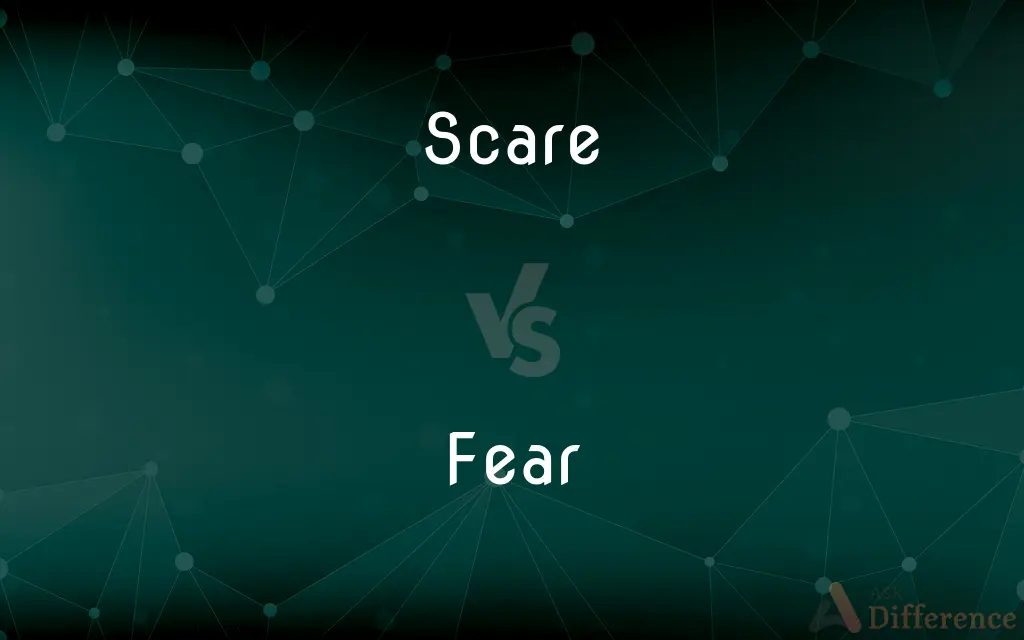Scare vs. Fear — What's the Difference?
By Tayyaba Rehman & Urooj Arif — Updated on March 11, 2024
Scare is a sudden feeling of alarm or fright, whereas fear is a more prolonged, deep-seated emotion of apprehension or dread.

Difference Between Scare and Fear
Table of Contents
ADVERTISEMENT
Key Differences
Scare typically refers to an immediate, often short-lived reaction to a specific threat or surprising event, resulting in a sudden burst of adrenaline and a fight-or-flight response. Fear, on the other hand, is a more sustained emotional state, stemming from the anticipation or awareness of danger, whether real or imagined. It can persist and affect behavior and thought processes over time.
While a scare is usually triggered by a specific, identifiable cause and subsides once the threat is removed or proven harmless, fear can be more diffuse and not always linked to an immediate or tangible threat. Fear can be rooted in past experiences, future anxieties, or even abstract concepts, influencing an individual's actions and decisions in a more profound way.
Scare can also be used as a verb, meaning to cause someone to feel a sudden burst of fright, whereas fear, also used as a verb, implies a deeper, more pervasive feeling of concern or anxiety about a potential threat. This distinction highlights the intensity and duration of the emotional response associated with each term.
In terms of physical response, a scare might prompt a sudden, intense reaction like jumping or screaming, often followed by a quick return to a normal state once the cause is understood. Fear, however, can lead to more varied and lasting physical and psychological responses, such as increased heart rate, avoidance behavior, and even changes in sleeping or eating patterns due to prolonged stress.
Scare often serves as a momentary wake-up call or alert to potential danger, playing a critical role in immediate survival. Fear, with its deeper and more enduring nature, can motivate caution and careful planning, but it can also lead to long-term stress, anxiety, and avoidance behaviors if not managed effectively.
ADVERTISEMENT
Comparison Chart
Nature
Sudden and short-lived
Prolonged and deep-seated
Trigger
Specific, immediate threat
Anticipated or imagined danger
Duration
Brief, subsides quickly
Can be long-lasting
Physical Response
Immediate reaction (e.g., jumping)
Sustained stress response (e.g., increased heart rate)
Emotional Impact
Momentary alarm or fright
Deep-seated apprehension or dread
Compare with Definitions
Scare
A scare is an abrupt feeling of fright often caused by an unexpected event.
The sudden appearance of a spider scared her.
Fear
Fear is a more continuous feeling of dread or apprehension.
He has a deep-seated fear of heights that affects his daily life.
Scare
Scare is usually triggered by a distinct, identifiable cause.
A loud noise in the dark can give someone a scare.
Fear
Fear often stems from the anticipation of danger, not just immediate threats.
The fear of failing the exam haunted her for weeks.
Scare
Scare typically subsides quickly once the perceived threat is gone.
After realizing it was just a prank, his scare quickly turned into laughter.
Fear
Fear can be caused by real or imagined dangers, and not always clearly defined.
Fear of the unknown is a common human experience.
Scare
A scare acts as a quick alert to potential danger, prompting an immediate response.
The scare from the smoke alarm made them check the house for fire.
Fear
Fear can significantly influence behavior, leading to avoidance or cautious actions.
His fear of rejection kept him from applying for the job.
Scare
Scare often leads to an instantaneous physical reaction, like jumping or screaming.
The scare from the horror movie made her jump out of her seat.
Fear
Fear can cause prolonged stress responses, affecting overall well-being.
Living in constant fear can lead to anxiety disorders.
Scare
To strike with sudden fear; alarm.
Fear
Fear is an emotion induced by the perception or recognition of phenomena which can pose a danger or threat. Fear causes physiological changes and therefore may produce behavioral changes, such as mounting an aggressive response or fleeing the threat.
Scare
To become frightened
A child who scares easily.
Fear
A very unpleasant or disturbing feeling caused by the presence or imminence of danger
Our fears intensified as the storm approached.
Scare
A condition or sensation of sudden fear
That mask gave me a real scare.
Fear
A state or condition marked by this feeling
Living in constant fear of attack.
Saved as much as he could for fear of losing his job.
Scare
A general state of alarm; a panic
A bomb scare that necessitated evacuating the building.
Fear
A feeling of disquiet or apprehension
A fear of looking foolish.
Scare
Serving or intended to frighten people
Scare stories.
Scare tactics.
Fear
A reason for dread or apprehension
Being alone is my greatest fear.
Scare
A minor fright.
Johnny had a bad scare last night.
Fear
Extreme reverence or awe, as toward a deity.
Scare
A cause of slight terror; something that inspires fear or dread.
A food-poisoning scare
Fear
To be afraid or frightened of
A boy who fears spiders.
Scare
A device or object used to frighten.
Fear
To be uneasy or apprehensive about
We all feared what we would see when the grades were posted.
Scare
To frighten, terrify, startle, especially in a minor way.
Did it scare you when I said "Boo!"?
Fear
To consider probable; expect
I fear you are wrong. I fear I have bad news for you.
Scare
To frighten; to strike with sudden fear; to alarm.
The noise of thy crossbowWill scare the herd, and so my shoot is lost.
Fear
To revere or be in awe of (a deity, for example).
Scare
Fright; esp., sudden fright produced by a trifling cause, or originating in mistake.
Fear
To be afraid
Your injury is minor. Don't fear.
Scare
Sudden mass fear and anxiety over anticipated events;
Panic in the stock market
A war scare
A bomb scare led them to evacuate the building
Fear
To be uneasy or apprehensive
We fear for the future of the business.
Scare
A sudden attack of fear
Fear
(uncountable) A strong, uncontrollable, unpleasant emotion or feeling caused by actual or perceived danger or threat.
He was struck by fear on seeing the snake.
Scare
Cause fear in;
The stranger who hangs around the building frightens me
Fear
(countable) A phobia, a sense of fear induced by something or someone.
Not everybody has the same fears.
I have a fear of ants.
Scare
Cause to lose courage;
Dashed by the refusal
Fear
(uncountable) Terrified veneration or reverence, particularly towards God, gods, or sovereigns.
Fear
(transitive) To be afraid of (something or someone); to consider or expect (something or someone) with alarm.
I fear the worst will happen.
Fear
(intransitive) To feel fear.
Never fear; help is always near.
Fear
To worry about, to feel concern for, to be afraid for.
She fears for her son’s safety.
Fear
(transitive) To venerate; to feel awe towards.
People who fear God can be found in Christian churches.
Fear
(transitive) To regret.
I fear I have bad news for you: your husband has died.
Fear
To cause fear to; to frighten.
Fear
To be anxious or solicitous for.
Fear
To suspect; to doubt.
Fear
(dialectal) Able; capable; stout; strong; sound.
Hale and fear
Fear
A variant of Fere, a mate, a companion.
Fear
A painful emotion or passion excited by the expectation of evil, or the apprehension of impending danger; apprehension; anxiety; solicitude; alarm; dread.
Fear is an uneasiness of the mind, upon the thought of future evil likely to befall us.
Where no hope is left, is left no fear.
Fear
Apprehension of incurring, or solicitude to avoid, God's wrath; the trembling and awful reverence felt toward the Supreme Being.
I will put my fear in their hearts.
I will teach you the fear of the Lord.
Render therefore to all their dues; tribute to whom tribute is due . . . fear to whom fear.
Fear
That which causes, or which is the object of, apprehension or alarm; source or occasion of terror; danger; dreadfulness.
There were they in great fear, where no fear was.
The fear of your adventure would counsel you to a more equal enterprise.
Fear
To feel a painful apprehension of; to be afraid of; to consider or expect with emotion of alarm or solicitude.
I will fear no evil, for thou art with me.
Fear
To have a reverential awe of; to be solicitous to avoid the displeasure of.
Leave them to God above; him serve and fear.
Fear
To be anxious or solicitous for; now replaced by fear for.
The sins of the father are to be laid upon the children, therefore . . . I fear you.
Fear
To suspect; to doubt.
Ay what else, fear you not her courage?
Fear
To affright; to terrify; to drive away or prevent approach of by fear.
Fear their people from doing evil.
Tush, tush! fear boys with bugs.
Fear
To be in apprehension of evil; to be afraid; to feel anxiety on account of some expected evil.
I exceedingly fear and quake.
Fear
An emotion experienced in anticipation of some specific pain or danger (usually accompanied by a desire to flee or fight)
Fear
An anxious feeling;
Care had aged him
They hushed it up out of fear of public reaction
Fear
A profound emotion inspired by a deity;
The fear of God
Fear
Be afraid or feel anxious or apprehensive about a possible or probable situation or event;
I fear she might get aggressive
Fear
Be afraid or scared of; be frightened of;
I fear the winters in Moscow
We should not fear the Communists!
Fear
Be sorry; used to introduce an unpleasant statement;
I fear I won't make it to your wedding party
Fear
Be uneasy or apprehensive about;
I fear the results of the final exams
Fear
Regard with feelings of respect and reverence; consider hallowed or exalted or be in awe of;
Fear God as your father
We venerate genius
Common Curiosities
How long does fear last?
Fear can be a prolonged emotion, lasting from a few minutes to several years, depending on the underlying cause and individual coping mechanisms.
What triggers a scare?
A scare is typically triggered by a sudden, unexpected event or threat, causing a brief moment of alarm or fright.
Can a scare turn into fear?
A scare can evolve into fear if the initial fright leads to ongoing apprehension or anxiety about similar threats or events.
What are the effects of long-term fear?
Long-term fear can lead to chronic stress, anxiety disorders, avoidance behavior, and even physical health issues like heart problems.
Is fear always a bad thing?
While fear can lead to negative outcomes, it also serves as a protective mechanism, encouraging caution and preparedness in potentially dangerous situations.
Can animals experience scare and fear?
Yes, animals can experience both scare and fear, exhibiting immediate responses to threats and prolonged stress in dangerous environments.
How do culture and experience influence fear?
Cultural background and personal experiences can significantly shape what an individual fears and how they react to those fears.
How do people react to a scare?
Reactions to a scare often include immediate, reflexive responses such as jumping, screaming, or a sudden adrenaline rush.
How can one manage fear?
Managing fear often involves understanding the underlying cause, employing coping strategies such as relaxation techniques, and, if necessary, seeking professional help.
What is the difference between a phobia and fear?
A phobia is an irrational, intense, and persistent fear of a specific object, situation, or activity, often leading to extreme avoidance behavior.
Share Your Discovery

Previous Comparison
Doctrine vs. Ideology
Next Comparison
Barracuda vs. KingfishAuthor Spotlight
Written by
Tayyaba RehmanTayyaba Rehman is a distinguished writer, currently serving as a primary contributor to askdifference.com. As a researcher in semantics and etymology, Tayyaba's passion for the complexity of languages and their distinctions has found a perfect home on the platform. Tayyaba delves into the intricacies of language, distinguishing between commonly confused words and phrases, thereby providing clarity for readers worldwide.
Co-written by
Urooj ArifUrooj is a skilled content writer at Ask Difference, known for her exceptional ability to simplify complex topics into engaging and informative content. With a passion for research and a flair for clear, concise writing, she consistently delivers articles that resonate with our diverse audience.














































